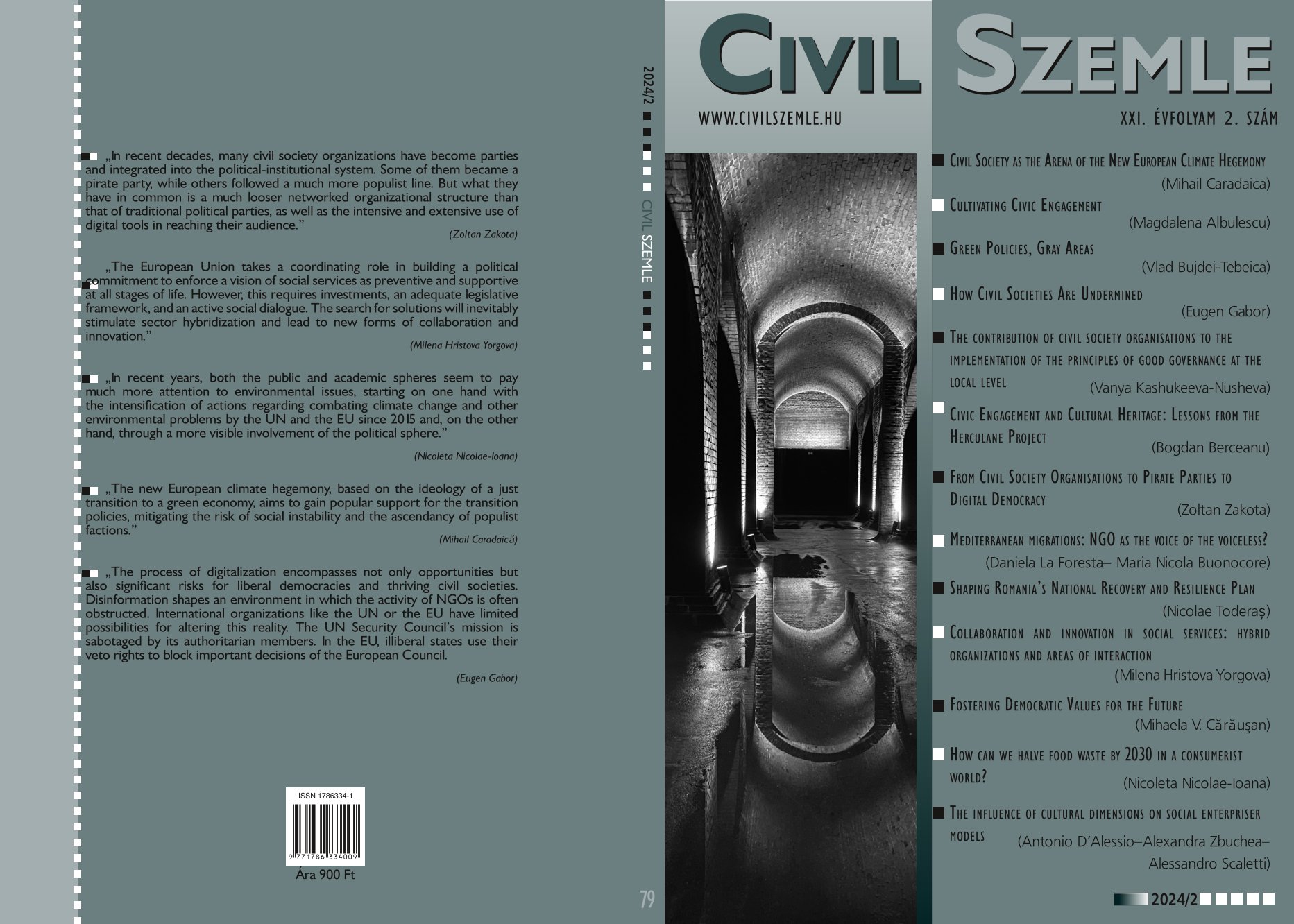From Civil Society Organisations to Pirate Parties to Digital Democracy
Absztrakt
Reshaping our political and social systems for a sustainable future requires a multifaceted approach that addresses several key areas, such as: political reform, social change, economic development, environmental preservation, or technological innovation. In order to achieve a sustainable future, we need to implement its ideals in every societal sector. When dealing with the political system, we cannot ignore the antidemocratic tendencies arising or taking over our everyday life even in the Western World. Under these circumstances, political reform is a must and we have to admit that one of its most important tasks is strengthening democracy. The actual political discourse is full of ideas like proportional representation, direct democracy, sustainability-focused governance, transparency, accountability, and equity. Among the many actors that try to solve these problems there is a group that proposes some new solutions, based on the means of Information Society, Pirate Parties. Emerging from the digital world, they are a fresh wave of political movements with deep roots in online activism. These parties, some born from anti-establishment protests, have rapidly spread across the globe in just two decades. Their journey is one of transformation, from grassroots movements to established political players. Pirate Parties have a clear digital agenda, focusing on issues like copyright reform, open access to information, and online privacy. They champion net neutrality and the free flow of knowledge. However, most of them have recognized the importance of broader democratic values for political success. Beyond their digital focus, Pirate Parties also advocate for traditional democratic ideals, including civil rights, transparency, and combating corruption. They promote free speech, direct democracy, and exploring alternative forms of citizen participation in government, often leveraging technology (e-democracy). The future impact of Pirate Parties remains uncertain, but their influence is undeniable. They’ve challenged traditional political norms and brought issues of the digital age to the forefront. Pirate Parties have reshaped the European political landscape and inspired similar movements around the world. My paper aims to briefly present these political formations, with special regard to their origins in and their relations with civil society. After outlining the broad framework, I present some of the most notorious of these formations.
Hivatkozások
Adler, A. (2018): Liquid Democracy in Deutschland. Zur Zukunft digitaler politischer Entscheidungsfindung nach dem Niedergang der Piratenpartei. Bielefeld: Transcript Verlag.
Altman, D. (2019): Citizenship and Contemporary Direct Democracy. Cambridge: University Press.
Berg, S.–Hofmann, J. (2021): Digital democracy. Internet Policy Review, 10., (4.) https://doi.org/10.14763/2021.4.1612
Carp, R. (2023): The Rise and Fall of Digital Parties – Searching for a Common Model. Civil Review (Special Issue) V., pp. 107–112. Retrieved 04 07, 2024, from https://www.civilszemle.hu/005-kulonszam-2023-5-civil-szemle/
c-base e.V. (n.d.): c-base. Retrieved 04 04, 20 24, from c-base: https://www.c-base.org/
Falkvinge, R. (2013): Swarmwise. The Tactical Manual to Changing the World. North Charleston, SC: CreateSpace Publishing Platform. Retrieved 04 01, 2024, from https://falkvinge.net/files/2013/04/Swarmwise-2013-by-Rick-Falkvinge-v1.1-2013Sep01.pdf
Falkvinge, R. (n.d.): Pirate Party of Berlin WINS, Enters Parliament. Falkvinge on Liberty. Retrieved 03 31, 2024, from https://falkvinge.net/2011/09/18/pirate-party-of-berlin-wins-enters-parliament/
Fieschi, C. (2019): Populocracy. The Tyranny of Authenticity and the Rise of Populism. Agenda Publishing Limited.
Fredriksson, M. (2015): The Pir ate Party and the P olitics of Comm unication. International Journal of Communication, 9., pp. 909–924. Retrieved 03 31, 2024, from https://ijoc.org/index.php/ijoc/article/view/3742/1339
Gerbaudo, P. (2019): The Digital Party. Political Organisation and Online Democracy. Pluto Press.
Marsh, S. (2011): German "pirates" gunning for a seat in Berlin. Retrieved 03 31, 2024, from Reuters: https://jp.reuters.com/article/idUSTRE78C48A/
Piratenpartei Deutschland (2024): Geschichte. Retrieved 04 04, 2024, from Piratenpartei Deutschland: https://www.piratenpartei.de/partei/geschichte/
Piratenwiki (2022): Liquid Democracy. Retrieved 04 03, 2024, from Piratenwiki: https://wiki.piratenpartei.de/Liquid_Democracy
Qvortrup, M. (2013): Direct democracy – A comparative study of the theory and practice of government by the people. Manchester–New York: Manchester University Press.
Wikipedia (2023): c-base. (Wikimedia Foundation Inc.) Retrieved 04 04, 2024, from Wikipedia
Die freie Enzyklopädie: https://de.wikipedia.org/wiki/C-base
Wikipedia (2024): Bundestagswahl 2009. ( Wikimedia Foundation Inc.) Retrieved 04 06, 2024,
from Wikipedia - Die freie Enzyklopädie: https://de.wikipedia.org/wiki/Bundestagswahl_2009
Wikipedia (2024): Bundestagswahl 2013. (Wikimedia Foundation Inc.) Retrieved 04 07, 2024, from
Wikipedia – D ie freie Enzyklopädie: https://de.wikipedia.org/wiki/Bundestagswahl_2013
Wikipedia (2024): Bundestagswahl 2017. (Wikimedia Foundation Inc.) Retrieved 04 07, 2024, from Wikipedia: https://de.wikipedia.org/wiki/Bundestagswahl_2017
Wikipedia. (2024, 04 06): Bundestagswahl 2021. (Wikimedia Foundation Inc.) Retrieved 04 14, 2024, from Wikipedia – Die freie Enzyklopädie: https://de.wikipedia.org/wiki/Bundestags-wahl_2021
Wikipedia (2024): Europawahl in Deutschland 2009. (Wikimedia Foundation Inc.) Retrieved 04 06, 2024, from Wikipedia – Die freie Enzyklopädie: https://de.wikipedia.org/wiki/Europawahl_in_Deutschland_2009
Wikipedia (2024): Wahl zum Abgeordnetenhaus von Berlin 2011. (Wikimedia Foundation Inc.) Retrieved 04 06, 2024, from Wikipedia – Die freie Enzyklopädia: https://de.wikipedia.org/wiki/Wahl_zum_Abgeordnetenhaus_von_Berlin_2011
Zakota, Z. (2023): Pirate Parties and Civil Organizations in the Information Society. Civil Review (Special Issue ) V., pp. 113–126. Retrieved 04 07, 2025, from https://www.civilszemle.hu/005-kulonszam-2023-5-civil-szemle/



